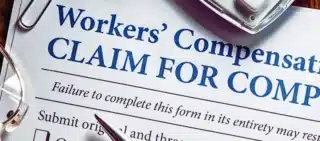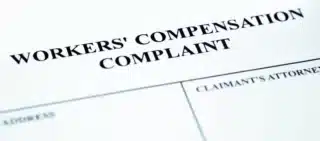
At Strong Law Offices, we have a team of workers' compensation lawyers who understand the financial setbacks and physical limitations...


You could file a workers’ compensation claim and third-party claim after suffering a work-related injury in Bloomington, but what is a third-party claim? A third-party claim is a separate claim filed against a person or entity other than your employer’s insurance company who was at least partially responsible for your work-related injury. With a third party at fault for your workplace accident and injury, you can file a claim and recover more damages than you would under workers’ compensation. Learn more about third-party claims and what you stand to gain by filing them in addition to your workers’ compensation claim below.

If you were injured while working for your employer, you’re eligible to file a claim for workers’ compensation benefits. You’ll work with your employer and its insurance company and comply with the filing requirements to receive the benefits. Besides workers’ compensation, injured workers can seek compensation through third-party claims. But what is a third party claim in the context of workers’ compensation cases?
Under Illinois law, you can’t sue your employer for damages after a workplace accident. You’re limited to the compensation you receive through workers’ compensation. However, if another party that’s not your employer or co-worker was totally or partially at fault for your work-related accident and injuries, you can file a third-party liability claim against that party. You and your employer are the first two parties. Therefore, any other party involved in your work injury or occupational illness is a third party.
Third-party claims are entirely separate from workers’ compensation claims. You can file a third-party claim while seeking or receiving workers’ compensation benefits. You can file a third-party lawsuit even if your workers’ compensation claim was denied. The third party’s insurance coverage could cover your damages.
Third parties that commonly cause workplace injuries include:
Numerous scenarios exist where a third party could be partially or fully at fault for work-related injuries.
Motor vehicle accidents are common cases where injured workers can file for workers’ compensation benefits and third-party claims against negligent drivers who don’t work for the same company. For example, assume a salesperson has just met one client and is driving a company vehicle to meet a different client. Unfortunately, the salesperson is rear-ended by a speeding car and suffers neck and back injuries.
The salesperson was injured by the negligent driver while doing an activity that benefited the employer. As a result, the employer, through its insurer, still has to pay the salesperson workers’ compensation benefits. The salesperson can also file a separate personal injury claim against the third party, the speeding driver, for the injuries sustained.
Slips and falls are among the top causes of work-related accidents and injuries. You can pursue workers’ compensation and third-party claims if a hazardous condition on someone else’s property caused your slip and fall injuries while you were there for work-related reasons. Suppose you fall and injure yourself while making a delivery due to an unrepaired condition or hidden defect you couldn’t see on the premises. You could file a third-party claim against the property owner or manager.
Third parties frequently cause accidents and injuries on construction sites. A construction site is a bustling work environment containing many employers. You could get injured due to the negligence of another business at the site, for which you could file a third-party liability claim. Multiple parties could be named defendants in third-party claims involving construction site accidents, such as general contractors, subcontractors, electricians, roofers, scaffolding companies, plumbers, architects, and site owners.
Defective tools and machines can severely injure those using them. You could file a lawsuit against the manufacturer, designer, seller, or distributor of the defective product or equipment that caused your workplace injury. You could also have a viable third-party case against the company contracted to maintain or service the equipment that injured you.
Exposure to toxic substances on worksites can cause severe injuries. Some negligent parties you can sue in such cases include the manufacturer of the substance, the manufacturer of protective gear that failed to protect you from the substance, and the property owner.
These are just a few examples of the many instances where you could file a third-party liability claim. Many Bloomington employees who were injured on the job assume they can only receive workers’ compensation benefits for their workplace accidents. However, you may have a potential third-party case that may not be so obvious. With the help of a Bloomington workers’ compensation lawyer who’s experienced in third-party claims, you can find out whether you have a viable third-party claim in addition to your workers’ comp claim.
The primary differences between workers’ compensation and third-party claims include:
Workers’ compensation in Bloomington and the rest of Illinois is a no-fault system. Even though there are workers' compensation investigations, you don’t have to prove who caused your injuries to be eligible for workers’ compensation benefits. You can receive workers’ compensation even if you or your employer caused your injury.
A third-party claim requires you or your lawyer to prove how another party was at fault for your injury to collect damages. You’ll need to demonstrate how another party’s negligence resulted in your damages. That usually requires proving:
When a workplace injury is caused by a defective or malfunctioning product, you can hold the manufacturer accountable through a strict liability claim. In such a case, you’ll only need to prove that the product was defective and that defect caused your injury.
Under the workers’ compensation system in Illinois, an injured employee can only recover compensation for medical bills, a portion of his or her lost income, and disability benefits, depending on the seriousness of his or her injuries. Illinois workers' compensation lump sum settlements may also be awarded to people who’ve sustained permanent work-related injuries. Workers’ compensation benefits only cover economic damages. They don’t cover non-economic damages, like pain and suffering.
Compensation from third-party claims includes economic damages as well as non-economic damages, such as pain and suffering, loss of enjoyment of life, emotional distress, and loss of companionship. Additionally, you can recover 100% of your lost wages from a successful third-party claim rather than a portion, as is the case with workers ’compensation. If you’re completely unable to return to work, you can recover compensation for the lost earning capacity resulting from the accident. A workers’ compensation lawyer can even help you recover punitive damages in some third-party liability lawsuits.
Workers’ compensation payments have a significantly shorter waiting period. You can receive your first paycheck within days of informing your employer of your work-related injury.
In a third-party claim, you’ll only receive payment from the at-fault party after there’s been a settlement agreement reached or a jury verdict. That can take months or years to happen. You’ll start receiving your workers’ compensation benefits way before your third-party liability claim is resolved.
Here’s more on the main benefits of filing a third-party claim in addition to a workers’ compensation claim.
When you fail to file a third-party claim when you have a viable case, you relieve the responsible party of its accountability. Financial responsibility should be put on the negligent party or parties that caused your injuries. Pursuing claims against these parties allows you to hold them accountable for all your injuries and financial losses and helps protect others from undergoing the same thing as you.
The amount of compensation injured workers can receive in third-party injury cases in Bloomington is usually greater than what they can get in workers’ compensation cases for the same injuries. State law limits the workers’ compensation benefits an injured worker can receive. Workers’ compensation benefits are helpful and important, but they never cover all damages victims of work-related accidents and illnesses suffered.
For instance, workers’ compensation disability benefits only provide a percentage of the income you’ve been unable to earn due to your injury. TTD benefits, for instance, provide two-thirds of your average weekly wage.
Damages in third-party claims are broader, including past and future medical costs, full coverage of your lost income and earning capacity, pain and suffering, and other non-economic losses unavailable through workers’ compensation. Third-party cases also tend to involve multiple parties, increasing the possibility for larger recoveries. A workers’ compensation lawyer can help you identify all the potential responsible third parties.
Some of the damages you receive from a third-party claim will be similar to your workers’ compensation benefits. Consequently, your employer or the insurer may place a lien on any potential settlement from your third-party claim. A lien gives the company a legal right to recover the medical expenses and lost wages paid to you through workers’ compensation benefits. An attorney experienced with both workers’ comp and third-party liability claims will ensure your rights are protected even as the insurance company exercises its subrogation rights.
In Illinois, you generally must file a third-party claim for your workplace injury within two years of the date of the accident. In some cases, such as when you realize you’re ill or injured after years of exposure to a hazardous substance, the statute of limitations may start running on the date you discovered the injury or illness.
Even if you believe you have plenty of time to file a claim against a third party, it’s best to act quickly. Remember, an attorney will need time to investigate your circumstances and collect the necessary evidence to support your case.
To file a third-party claim against the party that caused or contributed to your injury, you’ll need to submit the necessary paperwork to initiate the claim. You’ll essentially be filing a claim against the third party’s insurance company. Determining the legally responsible third parties to file a claim against isn’t always straightforward.
Building a successful third-party case usually requires a thorough investigation to identify the people or entities to hold accountable and collect as much evidence as possible to prove the party was negligent and caused your injuries. Helpful evidence that you may need includes:
As a result, it’s beneficial to have a personal injury lawyer to help you with your claim. Your lawyer will work closely with professional investigators, doctors, engineers, financial professionals, and other experts to help you build a strong case. After you or your lawyer has filed the necessary paperwork, the negotiation process with the other party’s insurer to resolve the case through a settlement can start. Your lawyer will negotiate with the insurance company to reach a settlement that covers your economic and non-economic damages.
If negotiations don’t lead to a favorable settlement, your attorney can take your case to trial and argue your case in front of a jury or judge. Remember, after a successful third-party claim, the workers’ compensation insurance company that paid your benefits may have a lien on the settlement or judgment awarded for reimbursement of some workers’ compensation payments. Your personal injury attorney can negotiate with both the workers’ compensation and third-party insurance carriers to maximize your net recovery.

At Strong Law Offices, we have a team of workers' compensation lawyers who understand the financial setbacks and physical limitations...

Common Equipment Involved in Run-Over Accidents Illinois job sites, from construction zones to industrial plants, depend on machinery to stay...

Why Do Employers Refuse to File Workers' Comp Claims? While most employers understand their legal obligation to report workplace injuries...